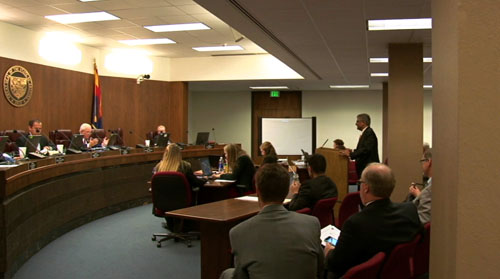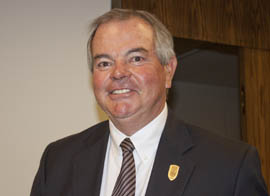Cronkite News has moved to a new home at cronkitenews.azpbs.org. Use this site to search archives from 2011 to May 2015. You can search the new site for current stories.
In presentation at Capitol, universities promote their economic impact
PHOENIX – Arizona’s public universities benefit the state’s economy by attracting and partnering with businesses, creating thousands of jobs and generating billions of dollars in direct and indirect expenditures each year, officials told state lawmakers Wednesday.
“A lot of people see education – particularly higher education – and they question the cost-benefit of it,” said Wayne Fox, assistant dean of The W. A. Franke College of Business at Northern Arizona University. “So the more we’re able to impart the economic realities of it … that’s a good message.”
Fox and representatives from Arizona State University and University of Arizona gave presentations to the Senate Commerce, Energy and Military Committee Wednesday. Each spoke about the contributions of their schools to Arizona’s economy and workforce.
Fox told the committee a recent NAU study found the school’s direct economic impact in the state to be $1.6 billion in 2010.
He said 75 percent of that impact occurred within Coconino County and that one in eight jobs in the county is directly linked to the university.
“Those are pretty big numbers for little old NAU,” he said.
Sethuraman Panchanathan, senior vice president of the Office of Knowledge Enterprise Development at Arizona State University, highlighted the school’s many programs that aim to further economic development through research and innovation.
“President (Michael) Crow really believes, and rightly so, that a university is a large enterprise and that we advance people and things,” he said.
Panchanathan said ASU’s partnerships with large corporations such as Boeing and Intel give students experiences that directly translate to job skills. Programs such as iProject at the College of Technology and Innovation allow students to work with industry partners to solve real-world problems, giving them unique experience in their fields of study, he said.
Mike Proctor, vice president of regional development and global initiatives at University of Arizona, focused on the school’s relationship with the defense and technology industries. He told the committee the defense industry accounts for tens of thousands of jobs in the southern part of the state.
“Some of them are here for the sun and the sand,” he said. “But some are here … because of the good flow of higher education agency and industry.”
He said the university has created several educational programs aimed at meeting the needs of the defense industry. For example, he said, the school recently added a Masters of Arts in International Security Studies and Bachelor of Applied Science in Meteorology.
Proctor called universities “unique social institutions” that can empower both students and communities to create opportunities through innovation.
“If you look at the U.S. economy, we still have the largest economy in the world, and we got there through leading,” he said. “And that’s what innovation is about.”











